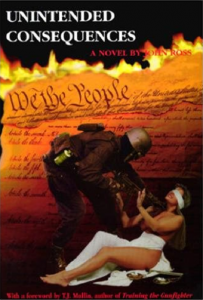An excerpt from the book “Unintended Consequences” by John Ross, which poses a thought-provoking question that only you can answer.
VIDEOS MENTIONED
- When Should You Shoot a Cop?
- The Terrifying Future of the US / We Control Our Future
- Want to End Police Brutality? Focus on the Institution
RELATED LINKS
- http://CopBlock.org/About
- http://CopBlock.org/Library
- http://CopBlock.org/JoinUs
- http://CopBlock.org/Groups
- http://CopBlock.org/Resources
- http://CopBlock.org/WelcomeLEOs
TEXT READ
From the forward from John Ross:
 A friend in law enforcement told me that because of this book’s content, I should not let it be published under my own name. Violent events happen in this story, and our country’s current situation is such that these events could indeed come to pass. My friend’s fear was that this book might precipitate such violence. He told me to expect to have drugs planted in my car during routine traffic stops, or have other similar miseries befall me and my family.
A friend in law enforcement told me that because of this book’s content, I should not let it be published under my own name. Violent events happen in this story, and our country’s current situation is such that these events could indeed come to pass. My friend’s fear was that this book might precipitate such violence. He told me to expect to have drugs planted in my car during routine traffic stops, or have other similar miseries befall me and my family.
He advised that if I did have this work published, I should use a pseudonym, employ an intermediary for all publisher contact, and in general prevent myself from being linked to the finished work, to avoid reprisals.
I didn’t do that, not only because of free speech considerations, but because I disagree with my friend’s hypothesis. I believe that if the instigators glimpse what may lie ahead, they will alter their behavior before wholesale violence becomes unavoidable. It is my hope that this book will reduce the likelihood of armed conflict in this country…
From pages 337-338:
“And so, Hobbes said that our lives are ‘nasty, brutish, and short’, and he used that as justification for the dictatorial powers of the monarch. Only by granting the State total power will we ever overcome our natural condition, which is to be perpetually at war with one another.” The Political Science course the professor was teaching was listed in the course catalog with a dry-sounding title that no one remembered. Throughout the Amherst campus it was referred to as ‘Right and Wrong’. Henry Bowman liked the class, mainly because the professor who taught it had a very sharp mind.
“Hobbes is just talking about our old friend, the…” and with this, the lecturer gestured with his arm t o show the class he wanted someone to finish the sentence for him.
“Benevolent dictatorship,” a Senior in the second row said quickly.
“Exactly, Mr. Hagner. Hobbes’ Leviathian is just one more scholarly justification for forfeiting your rights and allowing yourself to be subjected by the State. Learned, reasoned, articulate, and wrong. Thomas Hobbes has merely – Mr. Bowman,” the professor said suddenly, “you are shaking your head. That usually means you disagree with something that’s been said. What is it?”
“Professor Arkes, I don’t disagree with the basic principle, but it’s not enough just to say, ‘Totalitarian regimes are wrong, so don’t let the State enslave you’. That’s like saying, ‘Don’t get sick’. The important question is, when do you know it’s going to become enslavement? When is the proper time to resist with force?”
“Please elaborate, Mr. Bowman.” Henry took a deep breath.
“The end result, which we want to avoid, is the concentration camp. The gulag. The gas chamber. The Spanish Inquisition. All of those things. I you are in a death camp, no one would fault you for resisting. But when you’re being herded towards the gas champer, naked and seventy pounds below your healthy weight, it’s too late. You have no chance. On the other hand, no one would support you if you started an armed rebellion because the government posts speed limits on open roads and arrests people for speeding. So when was it not too late, but also not too early?”
“Tell us, Mr. Bowman.”
“Professor Arkes, I teach a Personal Protection class off campus, where most of the students who sign up are women. I’m seeing some strong parallels here, so please indulge me in an analogy.”
“Go ahead.”
“A woman’s confronted by a big, strong, stranger. She doesn’t know what he’s planning, and she’s cautious. Getting away from him’s not possible. They’re in a room and he’s standing in front of the only way out, or she’s in a wheelchair – whatever. Leaving the area’s not an option.
“So now he starts to do things she doesn’t like. He asks her for money. She can try to talk him out of it, just like we argue for lower taxes, and maybe it will work. If it doesn’t and she gets outvoted, she’ll probably choose to give it to him instead of getting into a fight to the death over ten dollars. You would probably choose to pay your taxes rather than have police arrive to throw you in jail.
“Maybe this big man demands some other things, other minor assaults on this woman’s dignity. When should she claw at his eyes or shove her ballpoint pen in his throat? When he tries to force her to kiss him? Tries to force her to let him touch her? Tries to force her to have sex with him?” Henry took a deep breath and shrugged.
“Those are questions that each woman has to answer for herself. There is one situation, though, where I tell the women to fight to the death. That’s when the man pulls out a pair of handcuffs and says, ‘Come on, I promise I won’t hurt you, this is just so you won’t flail around and hurt either of us by accident. Come on, I just want to talk, get in the van and let me handcuff you to this eyebolt here, and I promise I won’t touch you. I’m not asking you to put on a gag or anything, and since you can still scream for help, you know you’ll be safe. Come on, I got a full bar in here, and color TV, and air conditioning, great stereo, come on, just put on the cuffs.’
“I tell women that if that every happens, maybe the man is telling the truth, and maybe after talking to her for a while he’ll let her go and she will have had a good time drinking champagne and listening to music. But if she gets in the van and puts her wrists in the handcuffs, she has just given up her future ability to fight, and now it is too late.” Henry realized he had been making eye contact with all the other people in the lecture hall, just as he did when he taught a course. Now he looked directly at the professor.
“How do you spot the precise point where a society is standing at the back of the van and the State has the handcuffs out?”
The Question Only You Can Answer (An Excerpt from “Unintended Consequences”) is a post from Cop Block - Badges Don't Grant Extra Rights
